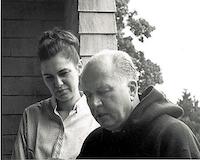I Knew a Woman
Theodore Roethke
I knew a woman, lovely in her bones, When small birds sighed, she would sigh back at them; Ah, when she moved, she moved more ways than one: The shapes a bright container can contain! Of her choice virtues only gods could speak, Or English poets who grew up on Greek (I'd have them sing in chorus, cheek to cheek).
How well her wishes went! She stroked my chin, She taught me Turn, and Counter-turn, and Stand, She taught me Touch, that undulant white skin; I nibbled meekly from her proffered hand; She was the sickle; I, poor I, the rake, Coming behind her for her pretty sake (But what prodigious mowing we did make).
Love likes a gander, and adores a goose: Her full lips pursed, the errant note to seize; She played it quick, she played it light and loose; My eyes, they dazzled at her flowing knees; Her several parts could keep a pure repose, Or one hip quiver with a mobile nose (She moved in circles, and those circles moved).
Let seed be grass, and grass turn into hay; I'm martyr to a motion not my own; What's freedom for? To know eternity. I swear she cast a shadow white as stone. But who would count eternity in days? These old bones live to learn her wanton ways: (I measure time by how a body sways).
About the Poem
Roethke wrote this around the time he married, Beatrice O'Connell.
Years after attending Roethke's classes at Bennington College, she attended one of his readings in New York. A month later, they were married.
She had but hints of his mental problems.
"There was a message left for me, a warning that I'd have him in and out of hospitals, but I was in love, even before we met again.
And I suppose he was, too, though I never quite knew for sure."
The were married 10 years, until his death
After which, she ensured the publication of his final work.

About Theodore Roethke 1908 - 1963
One of the very best poets of the mid-twentieth century, he influenced a generation of poets in America.
He taught at my own school, the University of Washington, for 15 years. Two of his students won, and two others were nominated for Pulitzer Prizes for Poetry,
He won the Pulitzer Prize for Poetry for his collection, The Waking.
He suffered from severe manic depression and alcoholism.
"The poem, even a short time after being written, seems no miracle; unwritten, it seems something beyond the capacity of the gods."
Special
Some of his phrases come to my lips on random occasions, and bring pleasure.

